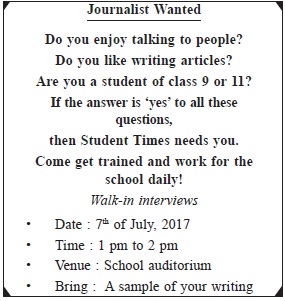Class : Class 8
Wit is intelligence which is seriousness of the thing also so satire which is mockery and not witty way to express would be more appropriate. Please request you to explain.
Post Your Answer
Post Your Answer
Ans 5:
Class : Class 4
A is a question sentence and B is a answer sentence, they have only sentence at the question that already mean answer sentence, Hence option B is correct , if they have given question answer then, A is correct, here they have not given question answer in the question ,Hence option B is correct
Post Your Answer
Post Your Answer
Post Your Answer
Post Your Answer
Ans 3:
Class : Class 8
You shouldn't put an interrogation mark after a greeting, so please don't choose Option C as the right option..:)
Ans 6:
Class : Class 10
in my opinion it should be option C because it has asked incorrect,not correct!!! Many students get confused in 'Choose the Incorrect option'.So,please don't get confused in these type of questions.
